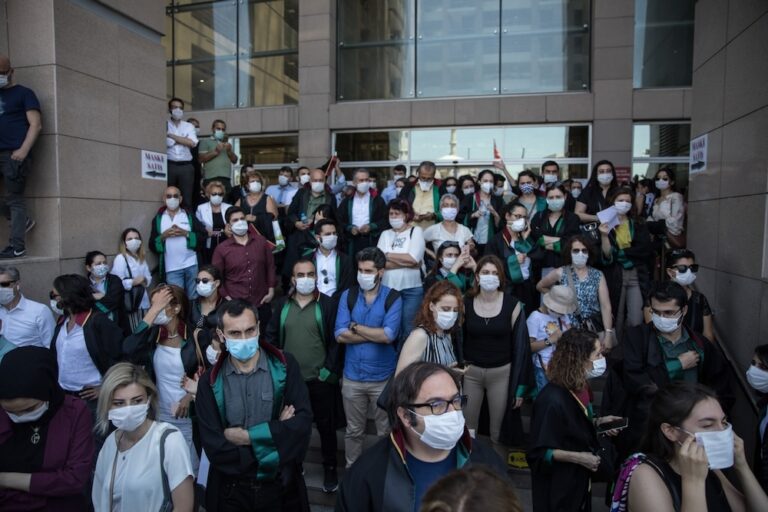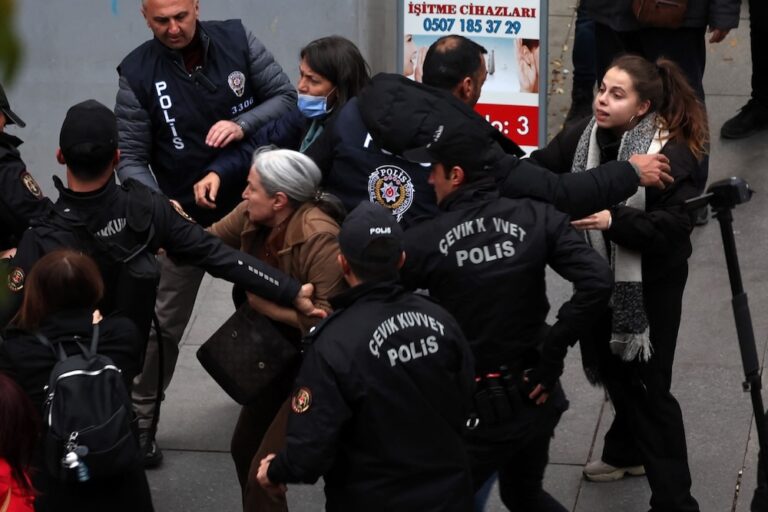(WiPC/IFEX) – The following is a WiPC release on jailed writer Esber Yagmurdereli: **Updates IFEX alerts of 5 June and 29 January 1998, 17 November, 14 November, 23 October and 25 July 1997, 19 December and 26 May 1995** “There is nothing further I can do. I am ready to go to jail and wait […]
(WiPC/IFEX) – The following is a WiPC release on jailed writer Esber
Yagmurdereli:
**Updates IFEX alerts of 5 June and 29 January 1998, 17 November, 14
November, 23 October and 25 July 1997, 19 December and 26 May 1995**
“There is nothing further I can do. I am ready to go to jail and wait
for a
political decision, for political change, for constitutional change,
that
will allow me to be freed .”
– Esber Yagmurdereli, Ankara, September 1997
On 5 March 1978 – twenty-one years ago – the blind writer, lawyer and
human
rights activist Esber Yagmurdereli walked into prison for the first
time,
aged thirty-three. He was to remain behind bars for thirteen years,
before
being conditionally released in 1991. Undeterred by the threat of
reincarceration, he immediately resumed his advocacy activities. He was
re-arrested in October 1997, released on the grounds of ill-health three
weeks later, but returned to prison on 1 June 1998. He is now serving a
ten-month term for a speech he made in defence of the Kurds of Turkey,
as
well as the remainder of a previous life sentence.
Esber Yagmurdereli was born in 1945 and went blind at the age of ten. He
graduated from Ankara University in law and philosophy, and then
qualified
as a lawyer. During the 1970s, when he practised in Turkey’s Black Sea
region, he became prominent for his defence of many leading left-wing
political figures. He simultaneously edited several magazines, including
“Yeni Eylem”, a political journal founded in 1968, and he made a name
for
himself as a poet and short-story writer. One of his short stories won
him a
famous literary prize.
These activities were cut short, however, by his 1978 arrest on a
confusing
plethora of charges. He was variously accused of hiding stolen goods,
leading an armed robbery, and of membership in an illegal organisation.
The
insubstantial criminal evidence against him evolved into two
allegations:
first, that weapons had been found in the house of one of his clients,
and
second, that a search of one of his neighbour’s houses elicited some
jewellery that the police said had been stolen. It took a court seven
years
to announce a verdict of guilty, in a trial that Amnesty International
said
fell far short of international standards. He was sentenced to death and
later commuted to life imprisonment, for “trying to change the
constitutional order by force.” His friends and colleagues had no doubt
that
the case against him had been framed as a way to silence him and halt
his
legal and literary activities.
While in jail, Yagmurdereli wrote more stories and poems – and a
screenplay
about a perversion of justice such as he himself had endured. In 1991,
the
remainder of his term was suspended, on condition that he never be
convicted
again. However, no sooner was he freed, that he gave a rousing speech at
a
human rights meeting in Istanbul trouncing the authorities and declaring
that for too long, the people had been “pushed into darkness” with
brutality
being used “as an instrument of repression.” He observed that the
Kurdish
population had had enough: they had now decided to reject “the
oppression of
thousands of years and the inhuman conditions in which they had been
forced
to live.”
His words were construed, under the Anti-Terror Law, as dissemination of
“separatist propaganda” and after a protracted legal process, a
ten-month
sentence against him was confirmed. He was jailed again on 20 October
1997
but, three weeks later, after suffering a minor heart complaint and
bronchitis, he was again released. His arrest was re-ordered in January
1998
and, despite international protests on his behalf, he was returned to
jail
on 1 June 1998.
Yagmurdereli is now in Çankiri Prison, about 130 kilometres from Ankara.
He
is an Honorary Member of the Canadian, Czech, San Miguel, Slovak and
Swedish
PEN Centres and an Amnesty International Prisoner of Conscience. It is
believed that, taking into account Turkey’s complicated laws regarding
remission of sentences, he is due for release in about 2015. His son,
Ugur –
who was born two weeks after his father’s initial arrest in 1978 – is
just
turning twenty-one, and is an outspoken supporter on his behalf. He
recently
staged a campaigning Cycle Ride to draw attention to his father’s
continuing
imprisonment.
Recommended Action
Send greetings to Yagmurdereli:
fellow
inmates of his will be able to read him messages of support
GREETINGS TO:
Esber Yagmurdereli
Çankiri Cezaevi,
Çankiri, Turkey
Fax: +90 376 213 24 35.
Mobile phone: +90 532 24 63 418
Contact the Turkish embassy in your country
When there, you can argue three things:
Turkey,
Yagmurdereli has now served out his ten-month term for the speech he
gave in
Istanbul in 1991
trial
much criticised by human rights experts on unconvincing evidence that he
was
guilty of anything other than peacefully expressing his opinions
the
human rights of all its citizens, Yagmurdereli should now be
unconditionally
freed
In Canada contact:
His Excellency Ambassador Omer Ersun
Embassy of the Republic of Turkey
197 Wurtemburg Street
Ottawa, Ontario
K1N 8L9
Tel: +613 789 4044
Fax: +613 789 3342
Appeals To
Send appeals to the Minister of the Interior
is
concerned, Yagmurdereli’s case represents a twenty-one year-long
perversion
of justice, that the initial trial against him failed to meet
international
standards and that he should now be granted an unconditional amnesty
Mr. Cahit Bayar,
Minister of the Interior
Ankara, Turkey
Fax: + 90 312 417 39 54
Copies to your country’s diplomats in Ankara. Please copy appeals to the
source if possible.


